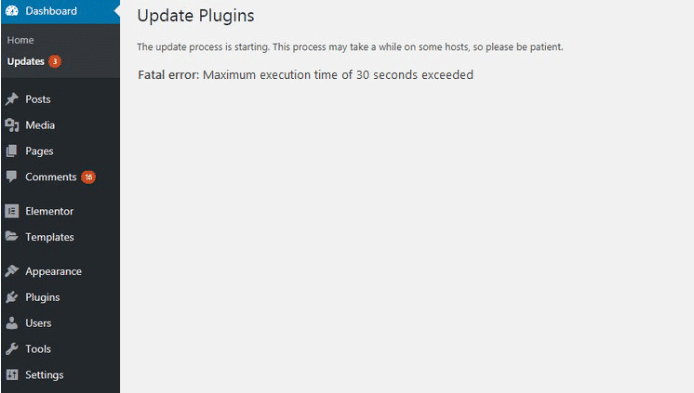The “Uncaught ValueError: Unknown format specifier” error sometimes pops up when there’s a problem with PHP on your website. This particular error can be hard to troubleshoot because it often stems from problems with a pluginA plugin is a software component that adds specific features and functionality to your WordPress website. Esse… More or theme’s code.

The good news is you don’t need to be a developer or even know your way around PHP to resolve the issue. This particular error is not unique to WordPress, but in this tutorial, we’ll focus on how to fix it when it appears on a WordPress site.
In this article, we’ll talk about what the “Uncaught ValueError: Unknown format specifier” error is and explain what causes it. Then, we’ll go over how to fix it. Let’s get to work!
What Is the “Uncaught ValueError: Unknown format specifier” Error?
As we mentioned, the “Uncaught ValueError: Unknown format specifier” error is not unique to WordPress. It originates in Python, when you try to format a string using a placeholder. It occurs when the placeholder is not properly defined or supported by the value you’re trying to insert.
If that sounds like gibberish, don’t worry. You can still try to solve this error without needing to change your site’s code. But, if you want to understand what the error is at a technical level, here’s the full explanation.
Although the error originates in Python, it also occurs in PHP. If you run into the error in WordPress, it’s because of a problem with the PHP code on your website.
For example, in the following code snippet, we’re using a format specifier that doesn’t exist in PHP:
echo sprintf("Hello %k", "World");Since “%k” is not a valid format specifier, PHP won’t be able to parse it and it will return the “Uncaught ValueError: Unknown format specifier” error.
That can happen on any website that uses PHP. However, in WordPress, the error typically pops up due to a very specific cause. In the next section, we’ll talk about what that cause is.
What Causes the “Uncaught ValueError” in WordPress?
If you run into the “Uncaught ValueError: Unknown format specifier” error in WordPress, it typically has to do with either a plugin or a theme. In most cases, the problem is that those elements are not optimized for the latest versions of PHP.
Let’s say, for example, you’re using a plugin that hasn’t received an update for years. The plugin might still work, but you’re likely to run into a lot of compatibility issues because of the following reasons:
By “optimized”, we mean that the plugins or themes weren’t developed with the latest tools and features that newer versions of PHP provide. To give more context, the latest major version of PHP (8.0) deprecates several functions and features. If a plugin uses those functions, you will run into errors.
This is not a small issue, as newer versions of PHP offer massive increases in performance and security. That means you’ll want to make sure your WordPress website uses the latest PHP version and that the plugins and themes you choose are compatible with it.
How to Fix the “Uncaught ValueError: Unknown format specifier” Error (2 Ways)
This is one of the few WordPress errors where the best way to fix it is somewhat out of your hands. There’s a simple fix to the error, but it’s one that comes with several downsides, which we’ll explain in the next sections.
1. Revert to an Older Version of PHP
It’s important to note that we don’t recommend switching WordPress to an older version of PHP. Newer versions offer a lot of performance optimizations and overall improvements that most sites can benefit from.
That being said, a lot of plugin and theme developers recommend switching to an older release of PHP if their products trigger the “Uncaught ValueError: Unknown format specifier” error on your website. Some WordPress web hosts give you full control over what version of PHP to use, so this can be feasible from a technical standpoint.
Still, in most cases, your best option will be to look for alternatives to the plugin or theme that’s causing the error. Unless that product offers features that are absolutely critical to your website, it might not be worth it to use an outdated version of PHP just to avoid looking for an alternative.
2. Contact the Plugin or Theme Developers
Most plugins or themes under active development will offer one or more channels you can use to contact the teams behind them. These channels enable you to ask for support or to report bugs.
When contacting a developer to report an error, they’ll probably ask you for a log of the entire error message. With the “Uncaught ValueError: Unknown format specifier” error, that typically means which lines of code are causing the problem.
You’ll also want to inform the developers of what version of WordPress and PHP you’re using. This information will help them determine whether you can make changes that will fix the error on your site or if they need to push out an update of their product.
The downside of this approach is that it’s not immediate. You’ll probably have to wait a while for a response and then for an update. During that time, your best bet is to disable the plugin or theme that is causing the error.
Conclusion
The “Uncaught ValueError: Unknown format specifier” error can be scary, but it’s a technical issue that’s fairly easy to troubleshoot in WordPress. Typically, the problem doesn’t have anything to do with your site’s configuration, but rather with the plugins and themes that you’re using.
The error tends to appear when you’re using the latest version of PHP on your website with a plugin or theme that isn’t compatible with it. In that scenario, your only two choices are the following:
- Revert to an older version of PHP (which can be problematic).
- Contact the plugin or theme developers.
Do you have any questions about the “Uncaught ValueError: Unknown format specifier” error? Let us know in the commentsComments are a feature of WordPress that allow users to engage in discussions about the content of a website. … More section below!





![How to Remove Tagline in WordPress [A Step-by-Step Guide]](https://codingheros.com/wp-content/uploads/2024/12/how-to-remove-tagline-in-wordpress-a-step-by-step-guide-768x142.png)